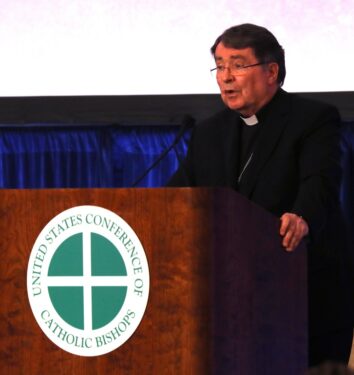
PROSPECT HEIGHTS — With the National Eucharistic Congress less than a month away, the papal nuncio to the United States wants the American bishops to remember that the Eucharistic revival isn’t necessary just for the laity, but for them, as well.
“It is good that as shepherds we are thinking about the needs of the flock … but let us not forget that we need Eucharistic revival, too,” said Cardinal Christophe Pierre. “As we approach the Eucharistic Congress, each of us can ask himself: Are we experiencing in our own lives the Eucharistic transformation that we want our people to experience?”
“These questions, asked in a posture of humble receptivity before the Lord, can invite from God the sort of answers that will incite Eucharistic revival within us, and will make us, as the Lord’s chosen shepherds, better witnesses to the Lord’s wounded and resurrected life, which he continues to live in the midst of his suffering and redeemed Church,” Cardinal Pierre said.
Cardinal Pierre made the comments in an address to the American bishops at the U.S. Conference of Catholic Bishops’ spring plenary assembly, which was held in Louisville, Kentucky, from June 12-14.
Cardinal Pierre made the remarks near the start of his approximately 20-minute-long address that more or less opened the gatherings first public session on June 13. In the address, he also commended the National Eucharistic Revival initiative, and noted that Pope Francis “is united with us in this desire that people rediscover the power of the Eucharist.”
At the end of the gathering on June 14, Bishop Andrew Cozzens of Crookston, Minnesota, who is chair of the National Eucharistic Congress, announced that congress registrations have now surpassed 40,000 five day passes, and 2,000-plus day passes. He said that at least 50,000 people have participated in the National Eucharistic Pilgrimage so far, as well.
Bishop Cozzens also reminded the bishops that the congress is a beginning, not an end.
“With all of the excitement about the Eucharistic Congress, it’s easy to forget that the Eucharistic Revival is only two-thirds over,” Bishops Cozzens said. “We have a whole year of mission, and always a goal from the beginning of this has been that the Eucharistic Congress would not end, but it would actually launch this year of mission.”
During the spring plenary, there weren’t many votes, but at least two consequential ones.
The American bishops passed “Keeping Christ’s Sacred Promise: A Pastoral Framework for Indigenous Ministry,” which includes an apology, and a commitment to accompaniment.
“We apologize for the failure to nurture, strengthen, honor, recognize, and appreciate those entrusted to our pastoral care. We can resolve now to prioritize our pastoral ministry with indigenous Catholics,” the document states. “We seek to accompany the indigenous peoples of this land in their faith through praying, listening, and seeking healing and reconciliation along the way, so that we can journey together toward the house of the heavenly Father.”
The bishops also gave unanimous approval to open a cause for the canonization of Adele Brise, a 19th-century Belgian-born immigration who is believed to have encountered the Blessed Virgin Mary in Wisconsin in 1859. The plan was brought forth by Bishop David Ricken of Green Bay, who said Brise provides a model for the bishops’ evangelization and catechesis efforts.
There were also a few notable updates at the spring plenary.
Suzanne Healy, the chair of the National Review Board — the body created to monitor the implementation of the Dallas Charter in 2002 — highlighted the substantial progress the American Church has made to address the abuse of minors, but also called for greater buy-in from bishops and warned against complacency.
“We must keep the child of today, the child of tomorrow, and especially that child of yesterday, at the center of all of our decision making.” Healy told the bishops.
“I am in awe of the many examples of compassionate, radical accompaniment occurring across the U.S,” Healy added. “Again, we cannot become complacent, and we must remain vigilant in ongoing support of these important ministries and their departments.”
Later in her address, Healy also spoke on the need for a document similar to the charter to be created to establish a framework for the pastoral response to allegations of abuse of adults, which she said is important to implement at this time.
“It is a fact and public sentiment that abuse hurts at every age. If we don’t respond compassionately to these cases, it diminishes the trust we are working so hard to restore in our Church,” Healy said. “The institutional response to these allegations appears to be lacking.”
Bishop Mark Seitz of El Paso, Texas, the U.S. bishops’ conference Migration Committee Chair, also announced in an address that the committee is creating a new parish education program to combat misinformation and create moments of encounter between immigrants and American citizens.
“The program seeks to align U.S. Catholics’ understanding and engagement on this issue with the Church’s teaching on migration, which offers a more balanced and nuanced approach, at the heart of which is our respect for the sanctity of human life, the God-given dignity of every person, and the well-being of families, native born and immigrant alike,” Bishop Seitz said.
After Cardinal Pierre addressed the American bishops at the start of spring plenary assembly, Archbishop Timothy Broglio of the Military Services, USA, the conference president, gave an address. He offered prayers for those affected by various conflicts around the world, and said the conference stands ready to help however possible.
Archbishop Broglio also posed a question to his fellow bishops.
“Can we be catalysts for a greater national unity in our own turbulent times?” Archbishop Broglio asked.
